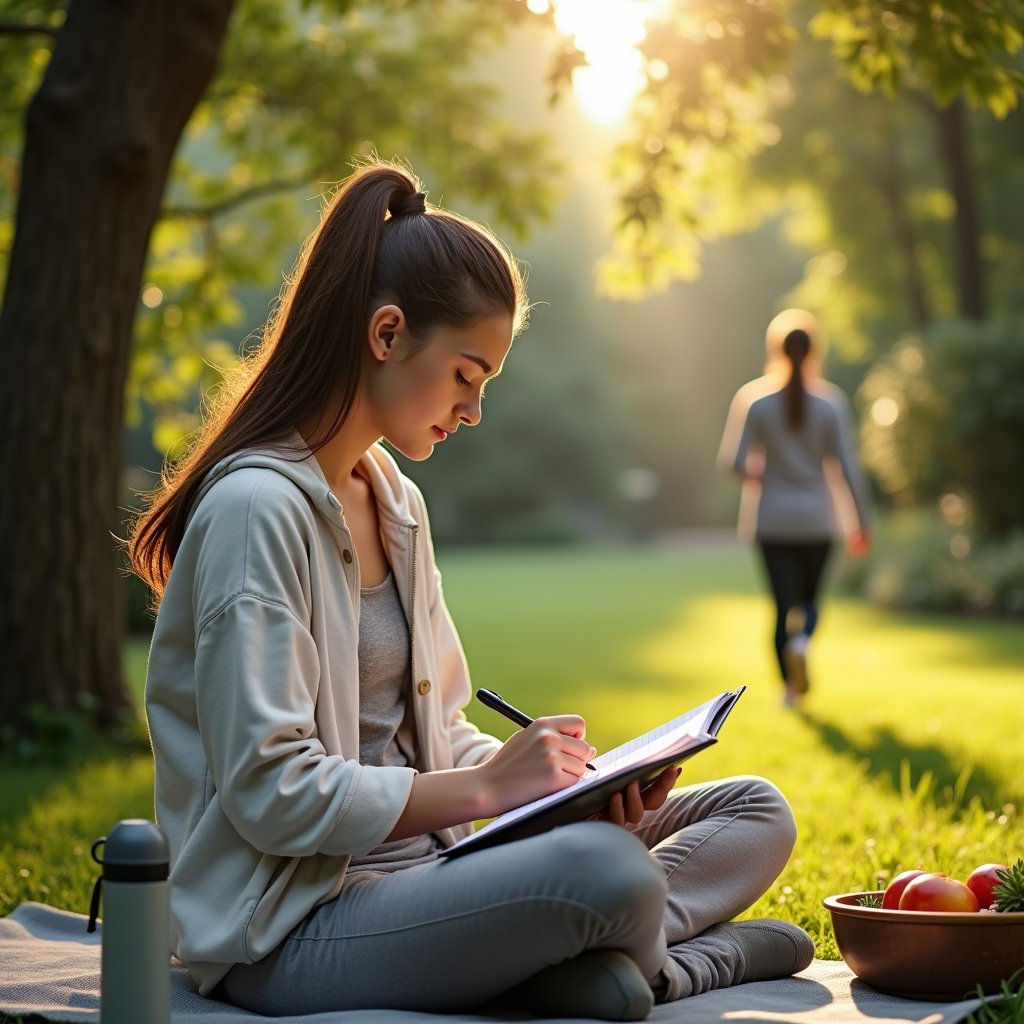Seven powerful activities can support your recovery path: establishing a structured daily routine, exploring creative arts for self-expression, joining support groups, maintaining regular exercise, learning new professional skills, practicing mindfulness meditation, and engaging in volunteer work. These evidence-based activities help rebuild mind-body connections, reduce anxiety, and create positive habits while strengthening your support network. Understanding how to integrate these activities effectively into your life can dramatically improve your chances of sustained sobriety.
Building a Structured Daily Routine

While recovering from addiction requires multiple strategies, establishing a structured daily routine stands as one of the most essential steps in the direction of sustainable sobriety. You’ll find that creating a daily checklist helps replace chaotic patterns with healthy, predictable habits that support your recovery expedition.
Start by scheduling outdoor activities and therapy sessions during morning hours when your energy is highest. You’ll want to build in regular exercise periods, mindfulness practices, and social connections throughout your day. Three nutritious meals are provided daily to help maintain your physical and mental wellbeing. Remember, you’re not just filling time you’re creating a new normal that actively prevents relapse and builds emotional stability. Research shows it typically requires 66 days to cement these positive habits into your lifestyle.
Exploring Creative Arts and Self-Expression

When you engage in creative arts during recovery, you’re not just passing time you’re tapping into powerful healing tools that have helped countless others achieve lasting sobriety. Through artistic self discovery, you’ll develop essential coping mechanisms while reducing stress and building self-esteem. Art therapy has shown remarkable success, reducing anxiety and depression symptoms by 73%. Community arts programs offer structured environments where you can safely explore emotions and connect with others on similar journeys. With private treatment facilities increasingly offering arts-based programs, patients can explore creativity while maintaining confidentiality.
Creative expression in recovery unleashes healing potential, helping you build coping skills while connecting with others on the path to sobriety.
Consider these proven creative approaches:
- Music therapy to manage cravings and regulate emotions
- Visual arts like painting or drawing for self-expression and introspection
- Acting or voice classes to build confidence and communication skills
These activities aren’t just hobbies they’re evidence-based tools that considerably reduce relapse rates. With over 38% of treatment programs now incorporating arts therapy, you’ll find numerous opportunities to pursue creative pathways toward lasting recovery.
Joining Community Support Groups

You’ll find both in-person and online support group meetings offer unique advantages for your recovery odyssey, with traditional face-to-face gatherings providing direct human connection while virtual options offer convenience and accessibility from anywhere.
Building your support circle starts with attending different types of meetings to uncover which format and group dynamics resonate most with your needs and schedule. Whether you choose 12-step programs, secular support groups, or a combination of both, you’re taking a pivotal step by connecting with others who understand your experiences and can offer valuable peer support during your recovery. With only 23% receiving treatment nationwide, support groups provide a crucial pathway to engage with recovery resources and build lasting connections. Research shows that mindfulness-based interventions have proven particularly effective at reducing substance use when incorporated into support group settings.
In-Person Versus Online Meetings
Today’s recovery terrain has opened up new possibilities for accessing support groups, with both in-person and online meetings offering distinct advantages. While personal preference plays a role, understanding the accessibility advantages and ideal engagement balance can help you make informed choices for your recovery path. Individuals who attend both meeting types demonstrate higher levels of mutual-help group involvement and improved outcomes.
Consider these key differences when choosing your support format:
- In-person meetings foster stronger accountability and interpersonal connections through face-to-face interactions and body language
- Online groups eliminate geographic barriers and provide immediate access during crisis moments, especially late at night
- Virtual options offer more scheduling flexibility and reduced stigma, while traditional meetings help establish foundational recovery bonds
Research suggests that participants who engage in face-to-face support groups are more likely to maintain their sobriety long-term. Your recovery needs may evolve over time, and you can benefit from both formats. Many find success with a hybrid approach, combining structured in-person sessions with convenient online support.
Finding Your Support Circle
Building a strong support network stands as one of the most crucial elements for sustainable recovery, with research showing that active participation in mutual help organizations markedly improves long-term sobriety outcomes. You’ll find that joining 12-step programs or similar support groups can expand your social connections while providing essential peer accountability.
Focus on cultivating healthy friendships within these communities, as research confirms that larger social networks correlate with better recovery success. When maintaining sponsor relationships, you’re creating a dedicated accountability partnership that strengthens your commitment to sobriety. Don’t hesitate to investigate multiple support options from local community groups to sober living environments. With only 20% of individuals maintaining sobriety without ongoing support, your active engagement in these networks considerably increases your chances of sustained recovery.
Developing Physical Wellness Through Exercise
Your body craves movement and power as you progress toward recovery, making exercise a formidable ally in your healing trek.
When you engage in regular physical activity, your brain releases natural endorphins that can effectively replace the artificial highs of substance use while reducing cravings and withdrawal symptoms. Exercise activities can help create positive mental habits that support sustained recovery. A commitment to just 75 minutes of vigorous exercise weekly can make a significant difference in your recovery journey.
Through consistent exercise, you’ll rebuild the essential mind-body connection that addiction disrupted, creating a foundation for lasting wellness and recovery success.
Exercise Builds Recovery Strength
When recovery feels challenging, physical exercise emerges as a powerful ally in building both bodily and mental strength. By rebuilding physical strength through regular movement, you’re not just improving your fitness – you’re creating a foundation for lasting recovery. Exercise naturally amplifies your mental clarity while reducing anxiety and depression common during withdrawal phases. The addition of mindful walks and similar activities has proven effective in supporting emotional well-being during recovery.
Consider these powerful benefits of incorporating exercise into your recovery:
- Your body produces natural endorphins during workouts, elevating mood and reducing stress without artificial substances
- Regular aerobic activity strengthens your cardiovascular system and immune function, helping prevent illness
- Group exercises and outdoor activities provide social support while removing you from trigger-rich environments
Endorphins Replace Addiction Cravings
Through consistent exercise, your body naturally produces powerful endorphins that can effectively replace the artificial highs once sought through substances. When you engage in activities like running, HIIT, or resistance training, you’ll trigger simultaneous dopamine and endorphin releases that mirror addiction’s reward mechanisms but without harmful side effects. Just as primitive brain circuits naturally reinforce survival behaviors, exercise can become a healthy, self-sustaining habit. The brain requires more intense activity over time as it becomes less receptive to pleasure, making progressive exercise ideal for recovery.
Exercise prescription customization helps you find the perfect workout blend for your recovery path. You might uncover that morning workouts align with your body’s rhythms, while group fitness classes provide essential social support. By cultivating intrinsic motivation through progress tracking and varied routines, you’re rebuilding trust in your natural reward systems.
Whether it’s a 20-minute session during cravings or a structured weekly program, regular physical activity can reduce relapse risk by up to 60% while fostering lasting neuroplasticity.
Movement Heals Mind-Body Connection
Physical movement serves as a powerful bridge between mental and physical healing during addiction recovery. Through mindful exercise, you’ll rebuild the essential mind-body connection that addiction often disrupts. This holistic healing approach helps you develop greater awareness of physical sensations, emotional states, and thought patterns.
Consider these transformative benefits of movement-based skill building:
- Your brain’s reward system naturally rebalances through exercise-induced dopamine release, helping restore healthy pleasure responses
- Daily physical activity strengthens your emotional resilience and provides a healthy outlet for managing stress
- Regular movement improves your sleep quality and stabilizes mood, addressing key recovery challenges
Learning New Professional Skills
As individuals in recovery navigate their path toward sustainable employment, learning new professional skills becomes an essential stepping stone to success. You’ll find that focusing on professional development through vocational training programs can considerably improve your employment prospects while supporting your recovery journey.
Start by honing interview skills and building professional networks through structured training programs that match your interests and strengths. Consider pursuing credential-focused courses in trades or healthcare, which have shown strong employment outcomes. Setting clear career goals and aspirations can help overcome common barriers to work reintegration.
You’ll benefit from programs that combine practical job training with recovery support services, addressing both your professional goals and general wellness. Don’t hesitate to investigate online learning options if transportation or scheduling presents challenges. Remember, many programs offer mentorship opportunities that can provide valuable guidance while reducing isolation during your professional development journey.
Practicing Mindfulness and Meditation
While recovering from addiction presents numerous challenges, mindfulness and meditation offer powerful tools to support your healing path. By cultivating self-compassion and advancing spiritual practices, you’ll develop essential skills for managing cravings, reducing stress, and preventing relapse.
Research shows that even brief mindfulness sessions can drastically improve your recovery outcomes. Studies indicate that patients who develop increased mindfulness levels are more likely to stay committed to their treatment programs. You can start with these proven techniques:
- Practice focused breathing exercises and body scans to increase awareness of physical sensations and emotional triggers
- Engage in loving-kindness meditation to build compassion for yourself and strengthen social connections
- Combine mindful awareness with cognitive strategies to better manage stress and cope with challenging situations
These evidence-based approaches work effectively alongside other treatment methods, helping you maintain long-term recovery while enhancing your overall psychological well-being.
Engaging in Volunteer Work
Beyond the inner work of mindfulness, volunteering offers a powerful path to strengthen your recovery voyage. You’ll find meaningful peer mentorship opportunities that not merely help others but also reinforce your own sobriety trek. By volunteering for sobriety events or addiction support programs, you’ll develop essential skills while building trust and connections within the recovery community.
Consider starting with structured roles like telephone support or event organization, where you can gain confidence gradually. You’ll unearth that giving back through service work naturally reduces depression, builds stress resilience, and creates a sense of purpose. As you engage in volunteer activities, you’ll develop valuable competencies in areas like crisis intervention and motivational interviewing, while expanding your pro-recovery network and strengthening your commitment to long-term sobriety.
Frequently Asked Questions
How Do I Explain My Recovery Journey to Potential Employers?
When discussing recovery history during job interviews, focus on your growth and professional development. You’re protected by the ADA and don’t need to disclose details unless relevant to job performance.
Highlight your commitment to personal development, resilience, and any skills gained through recovery. If you choose to share, keep it brief and emphasize your current strengths and dedication to maintaining a healthy work-life balance.
When Is It Safe to Start Dating Again During Recovery?
You’ll want to wait at least one year into your sobriety before dating to establish essential recovery relationship boundaries and achieve paramount sober dating milestones.
During this time, focus on rebuilding your identity and strengthening your coping skills. When you’re ready, guarantee you can maintain your recovery goals independently and recognize potential triggers.
What Financial Support Options Exist for Addiction Recovery Programs?
You’ll find several financial options to help cover addiction recovery costs. Government grants through SAMHSA and state programs can provide significant support, while private insurance and employer-sponsored plans often cover treatment expenses.
Don’t overlook non-profit organizations and treatment centers that offer scholarships or sliding-scale payments. Local programs and faith-based organizations may also provide financial assistance. Remember to check your eligibility for Medicare, Medicaid, or VA benefits if applicable.
How Do I Rebuild Trust With Family Members After Addiction?
You’ll need to rebuild trust gradually through consistent honest actions and transparent communication. Start by acknowledging past hurts and making sincere amends.
Focus on rebuilding self confidence through keeping promises, no matter how small. Show your commitment by establishing healthy boundaries and following through with recovery programs.
Be patient – trust takes time to restore. Regular family therapy sessions can help facilitate healing and open dialogue with your loved ones.
Can I Travel Internationally While Following Medication-Assisted Treatment Protocols?
Yes, you can travel internationally while on MAT, but you’ll need careful planning. Research travel restrictions for your specific medications in destination countries and coordinate with your treatment provider well in advance.
You’ll need proper documentation, including a doctor’s letter and original prescriptions. Consider working with your provider to arrange temporary care abroad or adjust your medication schedule. Always check embassy guidelines for current requirements.






